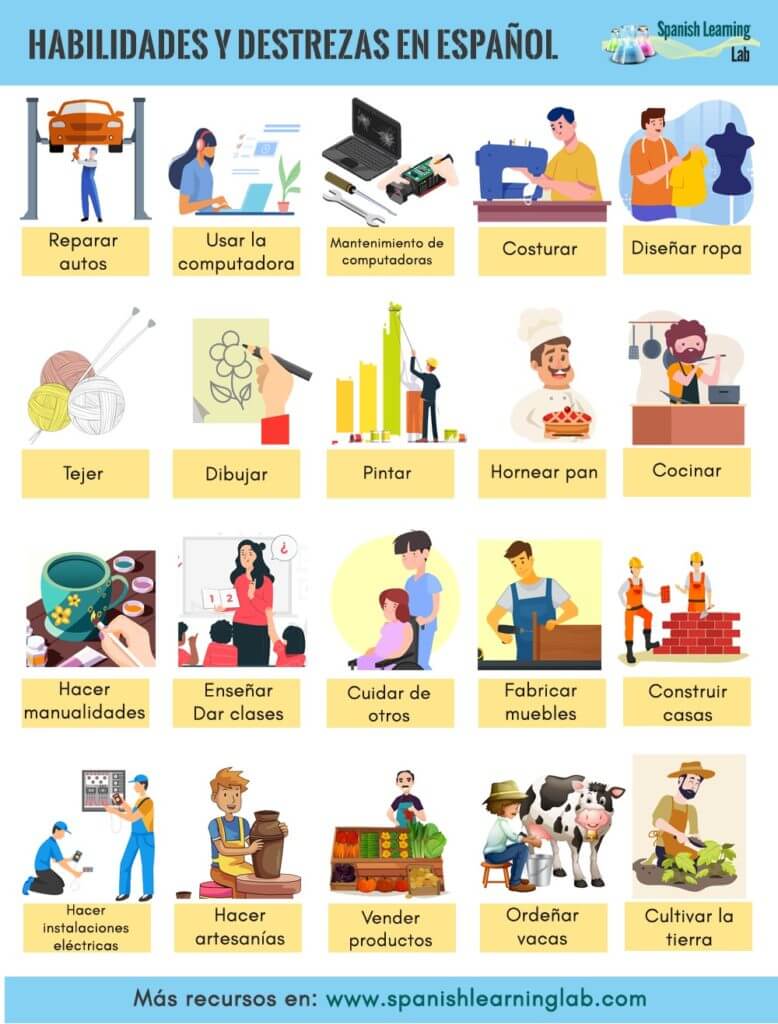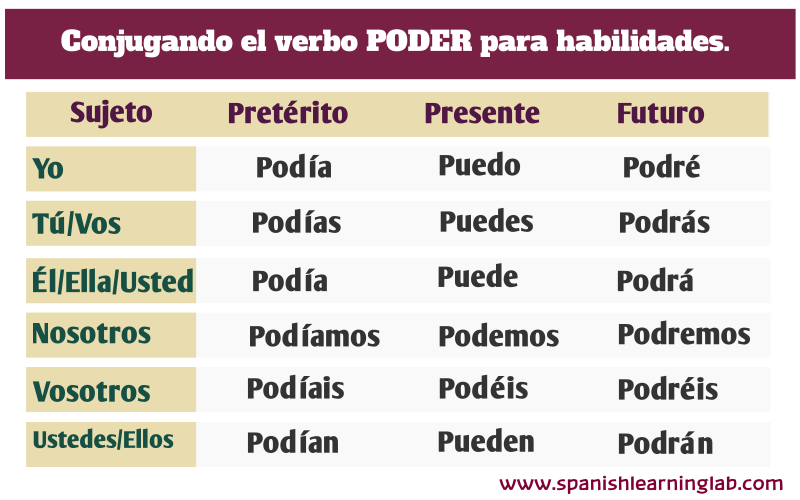Thank you very much for joining us for one more lesson. On this occasion, we will learn to use the verb PODER to talk about skills in Spanish. In addition, we will cover the vocabulary related to practical activities that we usually do and we will also practice listening with a conversation plus two interactive quizzes. Let’s start then…
Vocabulary: Abilities and skills in Spanish
First of all, pay attention to the following collection of images related to abilities and skills in Spanish. Try to associate the vocabulary with your own skills or those of people you know. Later, we will use the vocabulary in sentences and other exercises, so please do your best to remember these words.

Read and listen to the following group of sentences using the vocabulary in the image in addition to the verb PODER in Spanish and other ways of talking about skills:
|
Mi tío es mecánico, así que él puede reparar autos.
My uncle is a mechanic, so he can repair cars.
|
|
Yo puedo usar la computadora sin ningún problema.
I can use the computer without any problem.
|
|
¿Tú puedes costurar? – Tomé un curso de costura y sé hacerle algo bien.
Can you sew – I took a sewing course and I know how to do something right.
|
|
¿Te gusta tejer? – Puedo hacerlo, pero prefiero hacer otras manualidades.
Do you like knitting? – I can do it, but I prefer to do other crafts.
|
|
Marcos es una persona muy hábil. El puede hacer muchas cosas como fabricar muebles, hacer instalaciones eléctricas y mucho más.
Marcos is a very skillful person. He can do many things like making furniture, making electrical installations and much more.
|
|
Nosotros podemos hornear pan, pasteles y cocinar todo tipo de comida.
We can bake bread, cakes and cook all kinds of food.
|
|
¿Tú tienes la habilidad de vender cosas a otras personas? Yo soy muy malo en eso.
Do you have the ability to sell things to other people? I am very bad at it.
|
|
Estamos seguros que la empresa es capaz de construir las 30 casas en un período de 2 meses.
We are sure that the company is capable of building the 30 houses in a period of 2 months.
|
|
Los buenos maestros son capaces de enseñar y motivar a sus estudiantes para que ellos puedan lograr grandes cosas.
Good teachers are capable of teaching and motivating their students so that they can accomplish great things.
|
|
Mi sueño es trabajar en el campo, poder cultivar la tierra y cuidar de la naturaleza.
My dream is to work in the fields, to be able to cultivate the land and take care of nature.
|
Grammar: The verb PODER in Spanish and ways to talk about abilities.
The verb PODER is a verb undergoes a stem change (POD -> PUED) when conjugated in the present indicative and the past tense. For this reason, PODER will be conjugated like this in the past, present and future tense.

The verb PODER in Spanish is very useful to make requests and especially to talk about skills and abilities. It is the equivalent of the modal “CAN” of the English language in this sense. The difference is that in Spanish, we must find the appropriate form of the verb that corresponds to the pronoun based on the previous table, for example:
|
Yo puedo hablar español
I can speak spanish
|
|
Yo podía tocar la guitarra, pero olvidé cómo hacerlo.
I could play the guitar, but I forgot how to do it
|
In addition to “PODER”, it is possible to use other structures such as “Ser capz de” (be able to) to talk about abilities and skills in Spanish. In this case, we must conjugate the irregular verb SER appropriately and adapt the adjective CAPAZ (from singular to plural) depending on the subject in the sentence, for example:
|
Yo soy capaz de ordeñar una vaca
I am able to milk a cow
|
|
¿Ustedes son capaces de hacer artesanías de barro?
Are you capable of making clay crafts?
|
Listening Activity: Skills and intelligence types
We have reached the end of the lesson. We hope you found it very interesting. Thank you and see you soon.
